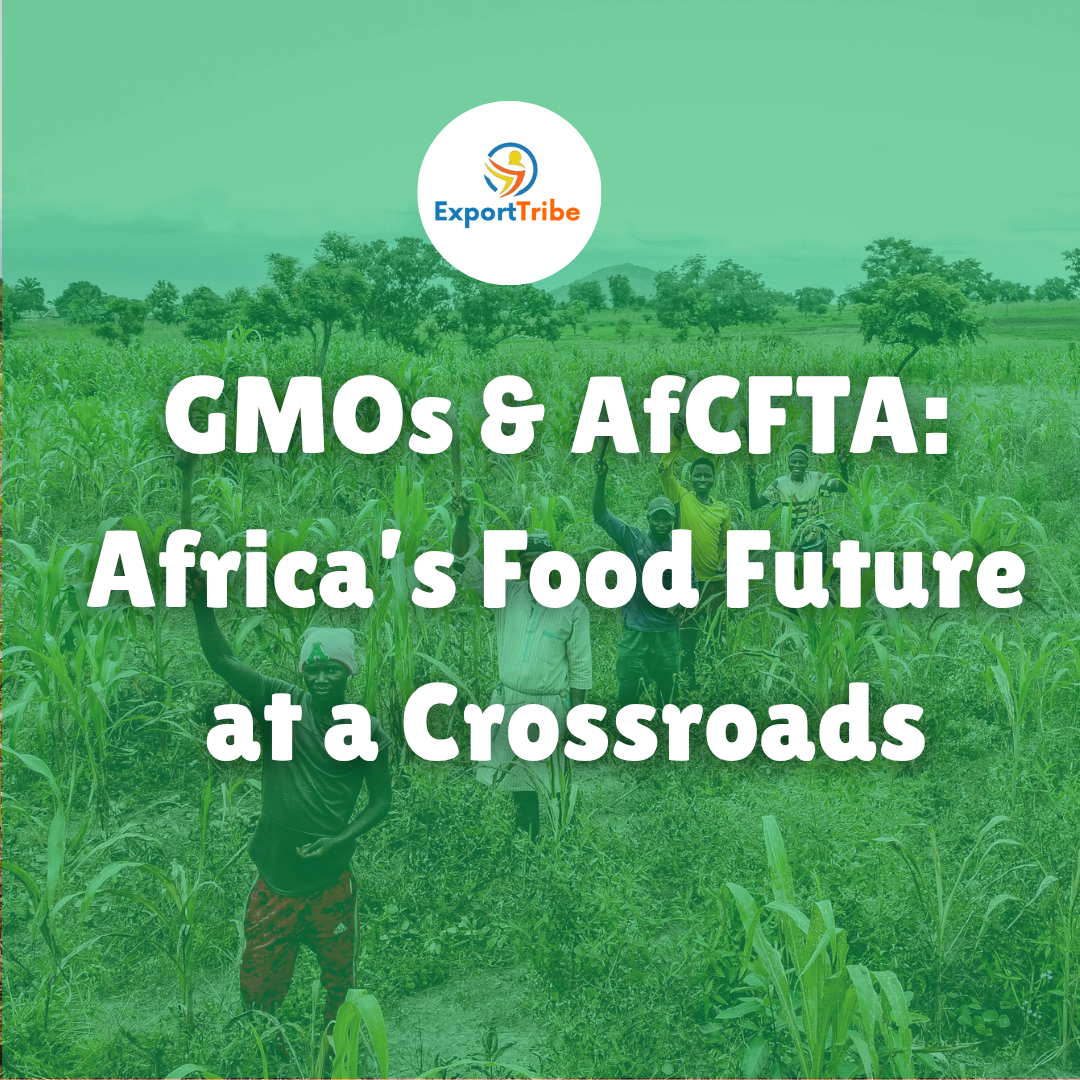At Export Tribe, we have always believed that the AfCFTA is more than just a trade agreement. It is Africa’s biggest chance to decide its own economic future. It is the opportunity to remove artificial barriers between our countries and create a single, powerful African market.
Agriculture sits right at the heart of this vision. And now, a new reality is unfolding — GMOs (Genetically Modified Organisms) are increasingly becoming part of Africa’s agricultural landscape.
This is where the conversation gets interesting and urgent.
GMOs are not a myth or a far-off technology. They are already here. From Bt maize in South Africa to pest-resistant cowpea in Nigeria, genetically modified crops are finding their way into African farms and food systems. Under the AfCFTA, these products will not just stay in one country; they will move across borders, shaping our regional food trade in ways we have never experienced before.
On one hand, the potential benefits are hard to ignore. Imagine higher crop yields that help feed our growing population. Imagine crops that survive drought and resist pests without heavy pesticide use. Imagine reduced post-harvest losses and more nutritious staple foods reaching communities that need them most. In a continent where food security remains a pressing challenge, this is a tempting promise.
But here’s where we must pause and ask, at what cost?
The truth is, GMOs come with legitimate concerns. Health experts continue to debate the long-term effects of consuming genetically modified foods. Some studies have raised questions about allergies, toxicity, and other health implications. There is also the economic risk, farmers may find themselves dependent on patented seeds from multinational companies, forced to buy them season after season instead of saving their own.
Environmentally, we face the possibility of biodiversity loss as local crop varieties are replaced by genetically uniform GMO strains. We have seen in other parts of the world how excessive reliance on certain herbicide-resistant crops has led to “superweeds” that are harder and costlier to control.
Now, let’s add another layer – trade.
What happens when a GMO-approved crop from one African country crosses into another country that bans it? Without a common framework, we risk border rejections, trade disputes, and fractured markets within AfCFTA itself.
This is why Export Tribe believes the AfCFTA must take leadership in creating a strong, united, continental GMO policy. This is not about saying “yes” or “no” to GMOs. It is about putting Africa in the driver’s seat — setting the rules, protecting our farmers, safeguarding consumer health, and preserving our biodiversity.
We need one continental standard for GMO safety that every AfCFTA member can trust. We need African-owned biosafety testing labs so we can rely on our own science, not just imported reports. We need policies that protect farmers’ rights to save seeds and preserve indigenous crop varieties. We need clear GMO labelling so that consumers can make informed choices about what they eat. And we need African-led research to develop GMOs that suit our unique climates, soils, and nutritional needs, not just products designed for other continents.
The AfCFTA gives us the structure to make this possible. But policy is only as strong as the will behind it. If we wait until problems arise, we will be reacting to crises instead of shaping our future.
At Export Tribe, we are convinced that Africa has the talent, the resources, and the unity to get this right. We must seize the moment to design a GMO policy that works for Africa, not against Africa. A policy that keeps the benefits here at home, strengthens our food systems, and supports fair, safe, and sustainable trade across our borders.
This is our moment. Let’s not just open the doors of African trade, let’s decide together what kind of products we want moving freely within our continental market. Because once those doors are wide open, it will be too late to decide who holds the keys.
💬 What do you think? Should AfCFTA take the lead in creating one GMO policy for all African countries? We’d love to hear your thoughts.

